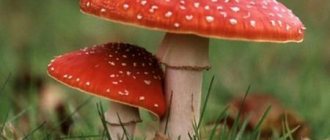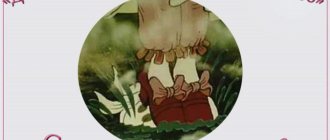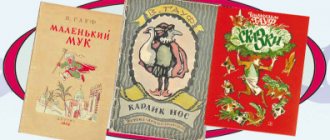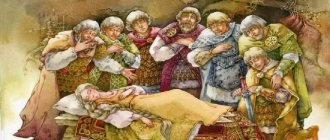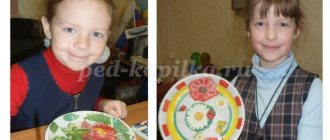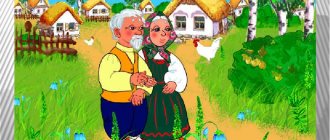Humor in folk tales is an integral part of folklore. Funny fairy tales will help not only cheer up, but also distract from routine activities for both adults and children. In them, adults and peers of the young reader, animals and birds find themselves in ridiculous situations. In addition to laughter, these works will unobtrusively teach children the ability to dream, empathize, notice and use wordplay in their speech. Read with pleasure, laugh and rejoice with your favorite characters!
Cones
Mikhail Plyatskovsky
The puppy Yelp lay in his booth and watched as the kid Marmeladik and the calf Rogalik played. And they played like this: they would run up to a pine tree, hit the trunk with their heads as hard as they could, and the cones would fall off the branches. The one who shot down the most wins.
Tyavka couldn’t stand it, he got out of the booth and went up to his friends.
- And I want to play with you. Do you accept?
“We don’t feel sorry,” said Rogalik.
- We accept! - Marmeladik said.
The kid knocked down five cones. Calf - as many as ten.
The puppy rushed towards the pine tree - and how he moved his head along the trunk with a running start. Even sparks fell from his eyes.
- Oh? Hurt! – he whined. Then the puppy Tyavka touched his head with his paw and asked his friends:
- Please look at what jumped up on my head...
Little goat Marmeladik says to him:
- Eh, we completely forgot that you have no horns at all!
And the calf Rogalik licked the puppy with his tongue and said with a sigh:
- You have... - a bump. One, but my own... And although I have ten, they are all pine. So don't worry and don't be upset?
Who will speak first
The old man and the old woman became so lazy that one day they argued about who should wash the pot. They decided that this would be done by the one who uttered a word first. Read with your children from the fairy tale who will lose their temper first and why. She teaches hard work, wisdom, reasonable actions, the ability to make concessions to loved ones, and condemns pride and stubbornness.
Once upon a time there lived an old man and an old woman. Lazy and lazy. They transferred all kinds of work to one another. They need to lock the hut with a hook by nightfall - they are having an argument.
- You should lock it.
- No, for you.
Unlocking it in the morning is another argument.
- Unlock it for you.
- No, for you. I locked it yesterday.
So they decided to cook porridge. After arguments and discord, the old woman cooked a pot of porridge. They sat down, ate porridge, they needed to wash the pot. The old man and the old woman began to argue again. The old woman says.
- I cooked porridge, and you need to wash the pot.
“No,” says the old man. Since you cooked, you should wash it. But I have never washed pots in my life and will never wash them.
Convenient search
This page contains more than 500 audio fairy tales for children and older children. Taking care of the comfort of users, we have created a hint system that allows you to easily find any fairy tale on the site.
Without opening the record itself, you can familiarize yourself with its following characteristics:
- Position of the audio tale in the overall rating.
- Age category for which it is intended.
- Illustration for the plot.
- Duration.
- Short description.
Thanks to our convenient service, you can listen to our audio tales for free online from anywhere in the world. Your favorite characters will always come to your aid when you need to console, entertain your baby or calm him down before bed.
Lord of Lords (English fairy tale)
One girl was hired to serve an eccentric elderly gentleman. He asks her:
- What will you call me?
“Master, or master, or whatever you wish, sir,” the girl answers.
“You should call me “lord of lords.” What would you call it? he asks, pointing to his bed.
- Bed, or bed, or whatever you like, sir.
“You should call it a “vacation retreat.” And this? - asks the gentleman, pointing to his drawers.
- Pants, or trousers, or whatever you like, sir.
“You should call them “fanfare headlights.” And this? he asks, pointing to the cat.
- Cat, or kitty, or whatever you like, sir.
“You should call her “Felicia Whiteface.” What would you call it? he asks, pointing to the water.
- Water, or moisture, or whatever you like, sir.
“You should call it “wet mundia.”
And this? - he points to the fire.
- Fire, or flame, or whatever you like, sir.
“You should call it “red rooster.” And this?” he points to his house.
- House, or mansion, or whatever you like, sir.
- You should call it “the vastness of heaven.”
That same night, the owner is awakened by the frightened cry of the maid:
- Lord of lords! Get off your resting place quickly and put on your headlights and fanfare! White-faced Felicia knocked over the candle, so that if you don’t run after Mocromundia right now, the red rooster will burn your entire mass under heaven.
Owl wise little head
Once upon a time there lived not a tsar-prince, not a king-prince, not a sage and not a wizard, not a magician and not a hermit, not a nobleman and not a nobleman, not a cautious politician, not a minister, not a military man, not an arrogant official, not a fat merchant , not a mellifluous singer, not a doctor or a healer, in a word - just a plowman, a daring peasant named Burachok. And he had a mind that was not royal, and not noble, and not lordly, but, as they say, the most peasant mind.
Once Burachok was in town, went to the market and bought a goggle-eyed owl there for a few pennies as a gift for his son. He walked with her back to his village. By evening Burachok was tired and began to think about spending the night. He looks: there is a light in the hut nearby. “Let me take a look there,” he thinks. Maybe good people will let you spend the night.”
He goes to the window and sees: on a table covered with a white tablecloth, there is a pie, fluffy and ruddy, just asking to be put into your mouth, and next to it is a roast goose and a bottle of honey. A fat young woman is sitting on a bench, knitting mittens, singing songs, waiting for her husband.
“You can’t say anything - the dinner is suitable!” - thought Burachok and knocked on the window: knock-knock!
- Who's there? Is that you, Metek?
- Let the passerby warm up, beauty.
The hostess began to fuss, running around the hut: in an instant the pie flew from the table into the kneading bowl, a bottle of honey into the chest, and a roast goose into the oven.
Fairy tales
Page 1 || Page 2
Russian folk tales
Reading Russian folk tales means becoming familiar with the culture of the people, one’s roots, beginning to understand their past and foreseeing the future. The tradition of reading bedtime stories to children has not disappeared. It is fairy tales that teach children to distinguish good from bad, truth from lies, good from evil. To teach reading at school, they use the texts of fairy tales and Ivan Tsarevich, Baba Yaga, the Frog Princess, the cunning fox and the simpleton wolf remain with us for the rest of our lives.
|
|
New on the site: German folk tale Heart of Stone
Alexander Sergeevich Pushkin Russian fairy tales
|
|
The fabulous brush of Ivan Bilibin
Folk and literary tales
| Is the fairy tale a lie? What are the wrong fairy tales about? Hey old lady! About Baba Yaga Mythological ideas of the Slavs This magical world of fairy tales. Literary fairy tales About illustrations for fairy tales |
Tales of Hans Christian Andersen. Danish fairy tales
— Andersen is the love of my life! - admits Lyudmila Braude, translator. — His fairy tales are for everyone - both children and adults. If I hadn’t read Andersen’s fairy tales, I don’t know how I would have survived the blockade and how I would have waited for my dad from the front. Andersen gave me, then just a little girl, the faith that everything would be fine. For me, even now, a fairy tale is a guide to life. Sometimes I remember some life situations and think: it’s like in a fairy tale! I know: if you read fairy tales to a child as a child, he will love good books. I really want the fairy tales of our writers to be translated into Finnish, Swedish, Danish, Norwegian... I am sure that Scandinavian children will also like Russian folk tales. Continuation
|
King of the fairy tale. A story about Andersen in the section “The Lives of Remarkable Children” |
Tales of Charles Perrault. French fairy tales
|
Charles Perrault - scientist and storyteller |
Fairy tales of the Brothers Grimm. German fairy tales
Real fairy tales should be a little scary and very alluring. Like a gingerbread house in which a terrible witch lives. In winter, it's time to re-read the fairy tale of the Brothers Grimm, in which Hansel and Gretel show miracles of resourcefulness, getting out of the gingerbread house! Continuation
|
|
Tales of Wilhelm Hauff. German fairy tales
|
German folk tales
|
English fairy tales
|
Swedish fairy tales
|
Tales of Vladimir Ivanovich Dahl. Russian tales
|
Business for life. V. Dahl |
Fairy tales of Leo Nikolaevich Tolstoy. Russian tales
|
|
Fairy tale by Samuil Yakovlevich Marshak.
|
Tales of Korney Ivanovich Chukovsky
|
|
Fairy tale by P. P. Ershov. Russian fairy tale
|
Tales of Maxim Gorky. Russian tales
|
|
Fairy tale by A. Pogorelsky. Russian fairy tale
|
Tales of Konstantin Dmitrievich Ushinsky. Russian tales
|
|
Tales of Astrid Lindgren. Swedish fairy tales
|
Tales of S. Topelius. Finnish fairy tales
|
|
Tales of Mikhail Mikhailovich Prishvin. Russian tales
|
|
Tales of Gianni Rodari. Italian fairy tales
|
|
About fairy tales
Competition for young local historians “Fairytale Russia”
Modern author's fairy tales
|
|
Fairy tales Page 1 || Page 2
Hare
A poor man was walking through an open field, saw a hare under a bush, was delighted and said:
- That’s when I’ll live in a house! I’ll take this hare, kill it with a whip and sell it for four altyns. With that money I will buy a pig. She will bring me twelve little pigs. The piglets will grow up and produce twelve more. I'll kill everyone, I'll save up a barn of meat. I’ll sell the meat, and with the money I’ll start a house and get married myself. My wife will give birth to two sons for me: Vaska and Vanka. The children will start plowing the arable land, and I will sit under the window and restore order: “Hey you guys, I’ll shout, Vaska and Vanka! Don’t push people too hard at work, you didn’t live in poverty yourself!” The man shouted so loudly that the hare got scared and ran away, and the house with all its wealth, wife and children disappeared.
Hey, bring in the horse (Italian fairy tale)
The driver Petruchio got married. After the wedding, he brought his young wife into the house and said to her:
- Now you and I, Rosina, will live well! I will work, you will manage. I'm not afraid of work. Even if you order me to drive a horse from dawn to dark, it will do nothing. But once I get home, that’s it! The rest is up to you. I’ll just stop the cart at the gate and shout: “Hey, bring in the horse!” - You hurry up and run out.
- Here's another! - said Rosina. - I’ll start tinkering with the horse.
- How can you not bother with her, because you need to unharness her, feed her, and give her something to drink! So, as soon as I shout: “Hey, bring in the horse!” “Yes, I’m telling you,” Rosina interrupted her husband, “that I won’t touch the horse.” This is not what I was taught at my mother and father’s house.
“Don’t worry,” said Petruchio, “I’ll teach you everything.” You will bring the horse into the yard. . .
- I won’t enter it!
- That is, how can you not enter it if I shouted: “Hey, enter it!..”?
- You scream, but I don’t move.
“Oh, Rosina,” said Petruchio, “don’t make me angry, it’s better to bring in the horse.”
- I won’t enter it! - Rosina shouted.
Then Petruchio also shouted.
- Enter it now!
- I won’t enter it!
- Enter!
- I won’t enter it!
Neighbors came running in response to the noise and began asking the newlyweds:
-What are you doing? What is the dispute about? Petruchio began to explain to the neighbors:
- Yes, my wife doesn’t want to help me. I tell her:
“Bring in the horse,” and she says: “I won’t.”
“Aren’t you ashamed to quarrel over this?” - said old Giuseppe. - Let me bring in your horse. Where do you have it?
“Yes, you see,” Petruchio hesitated, “we don’t have a horse yet.” I'm just about to buy it.
How to listen to a fairy tale with your baby
Listening to an audio recording of a work of art requires a serious concentration of attention from the child. This is an excellent training for mental processes - memory, thinking, attention, perception. Meanwhile, this is much more difficult for him than just reading with his mother and looking at pictures.
Therefore, before listening to a fairy tale online, it is recommended to prepare your child for listening, and then discuss with him what he heard:
- Briefly tell your child in advance what the fairy tale will be about, show illustrations by different authors for it.
- After listening, ask questions about the plot, ask to retell certain episodes.
This will allow you to determine whether the child understands the meaning of the audio fairy tale, or whether it is worth choosing simpler works for him.
Before bedtime, children are recommended to read quiet, calm fairy tales with a well-known plot.
How the master hatched a foal (Latvian fairy tale)
Once upon a time there lived a gentleman who loved horses more than anything in the world. There was only one thing on his mind - to get horses like no one else had. As soon as he hears about the horse fair, he drops everything and goes there, even though the lady herself is dying. Once this inveterate horseman went to the fair and met a peasant with a cart of cucumbers.
- What are you bringing? - the master asked him. And the peasant, the cunning one, answers:
“I’m bringing eggs that can be hatched into foals, the likes of which no one has ever had before.”
“Show me,” the master asked. The peasant showed it. The master chose the largest of these eggs and asked:
— How much does such an egg cost? And the peasant, the cunning one, answers:
- Three hundred rubles! The master pulled out his wallet and counted out three hundred rubles. And as he was leaving, the peasant finally looked back at the master and said:
“You need to put the egg in a pot and sit on it until the foal hatches.” And if anyone asks about what, he must answer only one thing: whoa! With that they parted, and each went his own way.
The master, returning home, immediately sat down to hatch the foal. The lady asked him why he was sitting for so long, and the master barked: whoa! Such an outlandish answer made the lady very angry, but, knowing what kind of husband she was, she left him alone - let him sit there. She ordered him to bring him food and drink, but she didn’t say another word to him. The master hatched and hatched, sat on the potty for three or four weeks, but never hatched anything. The master became completely depressed, and finally got tired of hatching the egg. He got angry, grabbed a pot of cucumber, ran into the forest and in his anger threw it into a pile of brushwood. Then suddenly a hare jumped out of a pile of brushwood and galloped into the forest. And the master shouts after him:
- Mob, mow, little coward, mow, mow!
But the hare got scared by the noise, ran at full speed and disappeared into the thicket. The master was sad, became sad and went home. And on the way he met the same peasant from whom he bought a cucumber for three hundred rubles. The master told the peasant that he had completely hatched a foal that no one else had, and, like a fool, he threw it away himself. And the peasant, the cunning one, listened, listened and said:
“That’s what happens to all the fools who don’t even know how to hatch a foal.” The master returned home and told the lady about his bitter fate. And when she heard what a fool her husband was, she didn’t want to see him anymore.
Evening tale 1: how the little bunny found new friends
In one wonderful country, in a small house on the edge of a forest, there lived a Little Hare. He grew up as a smart and kind boy, and always pleased his mom and dad with his successes and cheerful disposition. The little hare loved to run and jump on the grass, jump and have fun.
Only one thing upset Mother Hare - when it was time to sleep, Little Hare cried, struggled and did not want to go to bed at all. He would also snatch a pillow, throw it on the floor along with the blanket, and drag it around the house. Because of this, his pillow was always a little dusty - his mother simply did not have time to wash the pillowcases in time.
And one day the Little Bunny returned home from a walk, ate and was about to grab a pillow, but... it was nowhere to be found! No pillow, no blanket! Just a lonely and empty crib.
- Where is my pillow? And a blanket? – the Little Bunny asked his mother in fear.
But mom didn’t know either. She only told her son to go look for them.
The little bunny sighed and left the house. There was no one in the yard. The little hare ran and screamed, trying to find a pillow and blanket, but they did not respond. And then the little hare ran to the mushroom meadow - what if they ran there?
But there was only Hedgehog in the clearing. “Hello,” greeted the Bunny. -Have you seen the pillow and blanket? “No,” Hedgehog shrugged. – But if I see it, I’ll tell you! - Thank you! – the Little Bunny smiled at him and ran on.
He rushed as hard as he could, and then he ran up to the very blue sea.
“What if they are at the bottom?” - thought the Little Hare, and dived into the sea. But there was no pillow or blanket at the bottom. Just in case, the Little Hare even asked the fish if she had seen it. The fish silently shook its head. The little hare thanked her and promised to come visit.
Upset, the Little Hare swam ashore. He had already looked almost everywhere he could. But the pillow and blanket were missing. The bunny slowly walked towards the forest. And suddenly I saw the Mouse.
- Hello! - Greeted the Little Bunny. -Have you seen the pillow and blanket? - I saw it! – the Mouse squeaked in response. - They were sliding down the slide on the playground. - Exactly! - Little Bunny slapped himself on the forehead and ran to the site. - Thank you, Mouse! - Come visit for tea! - she answered. - Necessarily! – The little hare was already rushing towards the slides.
There, cold and tired, our lost things – a blanket and a pillow – huddled together. The little bunny began to hug them:
- My dear ones, are you cold? Let's go home quickly! I will never hurt you again!
And they all ran home joyfully and cheerfully. The little hare gladly went to sleep on his pillow and covered himself with a blanket. And the next morning there was a holiday, and new friends came to visit the Bunny - the Hedgehog and the Mouse. And together they visited Rybka in the sea.

